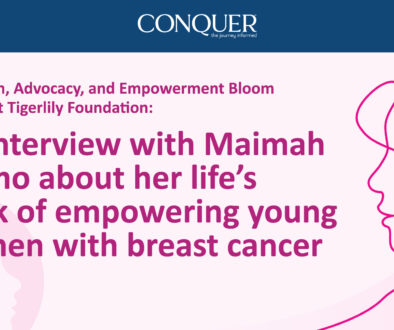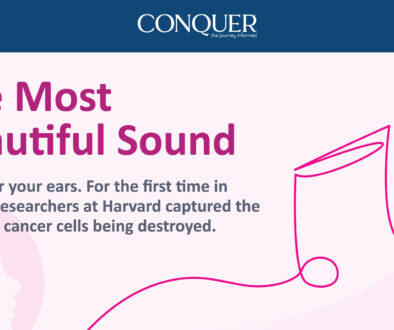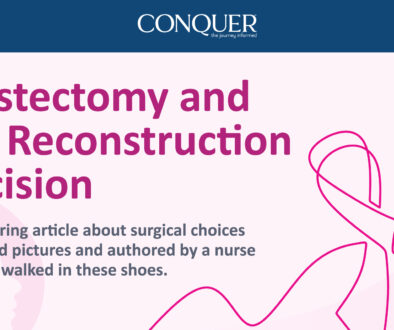August 2021 #PullUpASeat – Addressing Trauma and Changing Patient Outcomes
The Tigerlily Foundation and Guiding Researchers and Advocates for Scientific Partnerships (GRASP) launched a monthly conversation series, #KnowMoreDisparities and #PullUpASeat. Our August conversation focused on “Addressing Trauma and Changing Patient Outcomes”. Our August panel included our keynote speaker, Maimah Karmo, with patient experts, Lisa Lee, Antoinette Hall, Nediva Monroe and Aisha Patterson.
Maimah Karmo, Founder and President of Tigerlily Foundation, a fifteen-year breast cancer survivor, discussed the impact of cultural differences on trauma. Speaking from her African background, she shared the tendency for loved ones to push away trauma which was the case during her breast cancer journey. After her treatment, Maimah realized, through medical professional support, that trauma was the root cause of her sleepless nights, loss of appetite and mental breakdowns. She was taught to be a warrior and pillar for her family member but had nowhere to turn to discuss stress and trauma.
Maimah had no clue that she was dealing with Posttraumatic Stress Disorder (PTSD) after her cancer treatment. She was not provided a plan on how to deal with ripples of cancer once treatment ended. Maimah turned to a naturopathic doctor to help deal with her anxiety attacks. She searched for a life coach online who helped her identify and name her trauma. Maimah stated “We need to change how we deal with people, not just treat cancer, but the whole person.”
Nediva Monroe is a wife and mother of three boys, she is surviving a stage 1 IDC, ER/PR+/HER2-, breast cancer diagnosis since 2014. Nediva is thriving with a stage 4 IDC ER+, MBC diagnosis since 2019. Nediva opened up about her trauma that she developed before her breast cancer diagnosis, she was six months pregnant with twins when her twins transitioned. In the midst of her grief, she was diagnosed with breast cancer only three months later. In the safe space of the conversation, Nediva has decided to take the next steps to speak to someone about her trauma as she continues her journey.
Aisha Patterson is a breast health and mental health advocate. Aisha was diagnosed with HER2-, ER-, and PR-positive in November 2020, she underwent six rounds of chemo, double mastectomy and is currently going through 33 rounds of radiation. Prior to being diagnosed, Aisha had no proper knowledge about breast cancer, as she felt like it was mostly targeted to older white women and that young Black women were left out of that conversation. Aisha now spends her time dedicated to spreading knowledge about breast cancer and advocating for change.
Aisha shared about the positive effects of therapy on her family. While she was never directly advised by her health care team to seek therapy or any support, she took the initiative to find support for herself, spouse and children. Keen on finding therapy but unable to afford the high costs, Aisha was able to find a non-profit organization to support her mental health needs. She believes getting into therapy early into one’s diagnosis can help tremendously through one’s cancer journey and champions for health care teams to share this information with patients at the beginning of a diagnosis.
Antoinette Hall is a 28 year old, almost mother of two. After testing positive for the BRCA2+ in 2017, Antoinette chose a preventative double mastectomy surgery to lower her risk of developing breast cancer. During her process, Antoinette had to look to social media for help and guidance as she did not see any women that looked like her while she was undergoing her mastectomy journey. Antoinette now tries to spread the word about getting genetic testing done to young women of color, even if they do not have any family history of breast cancer. She expressed how it is common for Black women to not want to show weakness and how therapy still remains uncommon in many households. She declared that this needs to change as women should not feel weak for asking for help.
Lisa Lee, mom of five, was diagnosed with stage 2 lobular carcinoma of the right breast HER2-, PR +, ER+, with positive lymph node involvement in February 2020 on her birthday, at age 42. Lisa had a double mastectomy July 2020. Lisa had no family history of breast cancer and no genetic mutations. Lisa also touched on how important it is to take care of ourselves first, that self-love should always be prioritized. She shared about the impact her diagnosis had on her children and the importance of speaking with them frequently throughout the different stages of treatment.
Conversation Takeaways:
- Going to therapy early in your breast cancer diagnosis can help you in your cancer journey.
- We need to break the stigma around women being “weak” if they ask for help.
- Therapy needs to be normalized.
Resource Guide:



